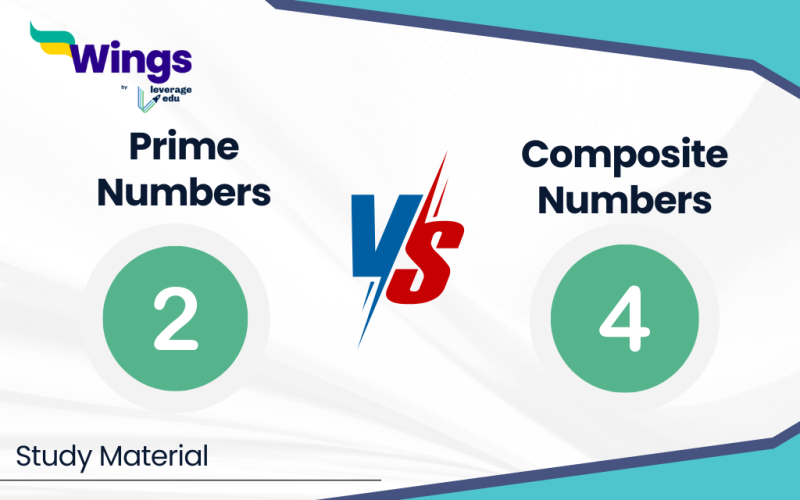The main difference between prime and composite numbers is that a prime number has two factors and composite numbers have more than two factors. In mathematics, numbers are the most important component in studying the subject. In the “Natural Number” bracket, the numbers are either divided between prime and composite numbers. Always remember that 1 is either a prime or composite number. All other numbers are either prime or composite.
Keep reading to know the basic difference between prime and composite numbers.
Table of Contents [show]
What are Prime Numbers?
Prime numbers in the mathematical form are natural numbers that have only two factors i.e. 1 and the number itself.
The first ten primes are 2, 3, 5, 7, 11, 13, 17, 19, 23, 29.
Here are some fun facts about Prime numbers:
- 2 is the smallest prime number.
- 59 and 61 both are prime numbers with a composite number between them, i.e. 60.
- 17 and 71 are both prime numbers. 71 is the reverse number of 17.
What are Composite Numbers?
Composite numbers are natural numbers that have more than 2 factors. For a fact, all natural numbers that are not prime, are composite numbers except 1.
The first ten primes are 4, 6, 8, 9, 10, 12, 14, 16, 18, 20.
Here are some fun facts about composite numbers:
- 4 is the smallest composite number.
- Composite numbers are evenly divisible by their factors.
- They are divisible by other composite numbers itself.
Also Read: Difference Between Parallel and Perpendicular
What is the Difference between Prime and Composite Numbers?
Here are some factors that can differentiate between prime and composite numbers represented in a tabular form:
| Particulars | Prime Numbers | Composite Numbers |
| Definition | Natural Numbers with only 2 factors | Natural Numbers with more than 2 factors |
| Smallest Numbers | 2 | 4 |
| Factorization | 1* P (Number itself) | 1* A* B… (A and B are Natural Numbers) |
| Number of Factors | 2 | More than 2 |
| Examples | 2, 3, 5, 7, 11, 13, 17, 19, 23, 29. | 4, 6, 8, 9, 10, 12, 14, 16, 18, 20. |
Also Read: Chain Rule Questions and Answers
Sample Questions on Prime and Composite Numbers
Let us practice some sample questions on prime and composite numbers to determine how much you have understood the basic difference between them:
Q.Which of the following numbers is prime?
a) 12
b) 17
c) 24
d) 31
Answer: b) 17
Q.How many prime numbers are there between 20 and 30?
a) 3
b) 4
c) 2
d) 5
Answer: a) 3
Q.Which of the following is a composite number?
a) 19
b) 23
c) 27
d) 29
Answer: c) 27
Q.What is the smallest prime number?
a) 1
b) 0
c) 2
d) 3
Answer: c) 2
Q.Which of the following statements is true?
a) All even numbers are composite.
b) All odd numbers are prime.
c) All prime numbers are odd.
d) All composite numbers are even.
Answer: c) All prime numbers are odd.
Q.How many factors does the number 12 have?
a) 2
b) 3
c) 4
d) 6
Answer: d) 6
Q.What is the only even prime number?
a) 2
b) 4
c) 6
d) 8
Answer: a) 2
Q.Which of the following numbers is neither prime nor composite?
a) 0
b) 1
c) 2
d) 3 Answer: b) 1
Q.Which of the following statements is true?
a) All prime numbers are composite.
b) All prime numbers are odd.
c) All composite numbers are prime.
d) All composite numbers are odd.
Answer: b) All prime numbers are odd.
Q.What is the product of the first five prime numbers?
a) 60
b) 120
c) 210
d) 230
Answer: b) 120
Similarities Between Prime and Composite Numbers
Here we have listed the similarities between prime and composite numbers in detail:
- Building Blocks: All composite numbers can be factored further into prime numbers. In other words, prime numbers are the fundamental building blocks of composite numbers. So, understanding primes is essential for working with composites.
- Infinite Sets: Both primes and composites are infinite sets. There’s no limit to how many prime or composite numbers exist.pen_spark
FAQ’s
No, 9 is not a prime number. It is a composite number because it has more than 2 factors such as 1,3 and 9.
A prime number is a natural number with only two factors such as 1 and the number itself. One such example is 13. The only two factors are 1 and 13.
A composite number is a natural number that has more than 2 factors. One such example is 8. It has more than two factors such as 1, 2, 4 and 8.
RELATED BLOGS
This was all about the “Difference Between Prime and Composite Numbers”. For more such informative blogs, check out our Study Material Section, you can learn more about us by visiting our Indian exams page.
 One app for all your study abroad needs
One app for all your study abroad needs















 45,000+ students trusted us with their dreams. Take the first step today!
45,000+ students trusted us with their dreams. Take the first step today!
